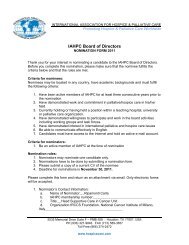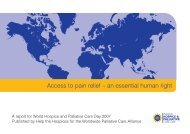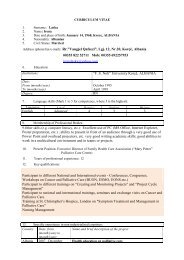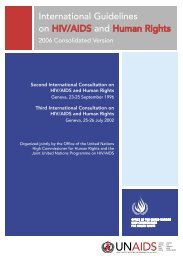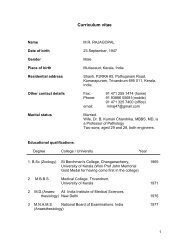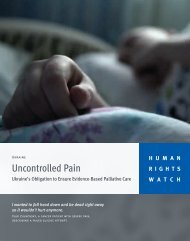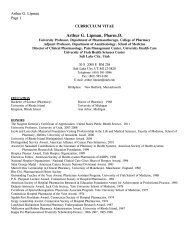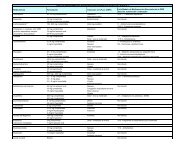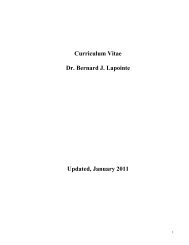INTERIGHTS Bulletin
INTERIGHTS Bulletin
INTERIGHTS Bulletin
Create successful ePaper yourself
Turn your PDF publications into a flip-book with our unique Google optimized e-Paper software.
<strong>INTERIGHTS</strong> <strong>Bulletin</strong><br />
Volume 16 Number 4 2011<br />
195<br />
Forcible Isolation of<br />
Tuberculosis Patients in<br />
Kenyan Jails<br />
Solomon Sacco, Allan Maleche and<br />
Omwanza Ombati<br />
Drug-resistant tuberculosis (DRTB) 1<br />
constitutes a serious challenge to<br />
health systems across the world, but<br />
particularly so in Africa with high<br />
levels of HIV infection and low levels<br />
of state spending on health. TB is<br />
highly infectious and the failure to<br />
adhere to treatment regimens is a<br />
prime cause of the development of<br />
DRTB. In many states public health<br />
authorities may apply to a court, or act<br />
on their own authority, for the<br />
isolation of patients with highly<br />
infectious and drug-resistant strains of<br />
TB. While such detention should and<br />
usually does take place in hospitals, in<br />
some countries, including Kenya,<br />
patients are detained in prisons. States<br />
have a legitimate interest in ensuring<br />
that individuals with DRTB take their<br />
medicines correctly and take the<br />
necessary precautions not to spread<br />
the disease. However, when they<br />
develop a public health policy they<br />
have to take into account the rights of<br />
the individual to liberty and freedom of<br />
movement and balance this against the<br />
legitimate governmental interest in<br />
maintaining public health. This article<br />
will examine this balance under<br />
international law as well as in a<br />
number of selected countries. We will<br />
also identify particular problems in the<br />
legal response to the problem in<br />
Kenya.<br />
Rights Engaged by the Coercive<br />
Detention of TB Patients<br />
The rights to liberty and freedom of<br />
movement are protected by Articles 9<br />
and 12 of the International Covenant<br />
on Civil and Political Rights (the<br />
ICCPR) and Articles 6 and 12 of the<br />
African Charter on Human and<br />
Peoples’ Rights (the African Charter) –<br />
both treaties have been ratified by<br />
Kenya. The Kenyan Constitution<br />
protects the right to liberty (or freedom<br />
as it is termed) in Article 29, freedom<br />
of movement in Article 39 and the<br />
right to human dignity at Article 28.<br />
The Kenyan Constitution 2010 also<br />
provides that every person has the<br />
right to the highest attainable standard<br />
of health, which includes the right to<br />
healthcare services. 2 However, it<br />
should be noted that the African<br />
Charter, the ICCPR and the<br />
Constitution of Kenya all allow<br />
limitations on most of the rights<br />
protected therein, including on the<br />
rights to liberty and freedom of<br />
movement. 3<br />
The extent of limitations is closely<br />
circumscribed by international law.<br />
The basic principles guiding a<br />
consideration of whether a limitation<br />
on the basis of public health is<br />
legitimate are whether it is:<br />
• strictly provided by the law…;<br />
• neither arbitrary nor discriminatory;<br />
• based on objective considerations;<br />
• necessary to respond to a pressing<br />
public health need (such as the<br />
prevention of TB transmission and the<br />
development of the disease following<br />
infection);<br />
• proportional to the social aim;<br />
• no more restrictive than necessary to<br />
achieve the intended purpose;<br />
•…(and) of limited duration and<br />
subject to review. 4<br />
Protection of public health is an<br />
important government interest on<br />
which the state is entitled, within<br />
certain limits, to rely when limiting<br />
rights. Thus s 25 of the Siracusa<br />
Principles on the Limitation and<br />
Derogation of Provisions in the<br />
International Covenant on Civil and<br />
Political Rights states that:<br />
Public health may be invoked as a<br />
ground for limiting certain rights in<br />
order to allow a state to take measures<br />
dealing with a serious threat to the<br />
health of the population or individual<br />
members of the population. These<br />
measures must be specifically aimed at<br />
preventing disease or injury or<br />
providing care for the sick and injured<br />
(Emphasis added).<br />
Commenting on the general principle<br />
of the necessity of detention the<br />
European Court of Human Rights (the<br />
European Court) has noted that:<br />
The detention of an individual is such<br />
a serious measure that it is only<br />
justified where other, less severe<br />
measures have been considered and<br />
found to be insufficient to safeguard<br />
the individual or the public interest<br />
which might require that the person<br />
concerned be detained. That means<br />
that it does not suffice that the<br />
deprivation of liberty is in conformity<br />
with national law, it must also be<br />
necessary in the circumstances and in<br />
accordance with the principle of<br />
proportionality. 5<br />
The European Court has gone on to<br />
elaborate on the specific test regarding<br />
detention for the prevention of the<br />
spreading of an infectious disease:<br />
The essential criteria when assessing<br />
the “lawfulness” of the detention of a<br />
person “for the prevention of the<br />
spreading of infectious diseases” are<br />
whether the spreading of the infectious<br />
disease is dangerous to public health<br />
or safety, and whether detention of the<br />
person infected is the last resort in<br />
order to prevent the spreading of the<br />
disease, because less severe measures<br />
have been considered and found to be<br />
insufficient to safeguard the public<br />
interest. 6<br />
For the purposes of this paper it will be<br />
accepted that control of persons<br />
infected with DRTB is directed towards



